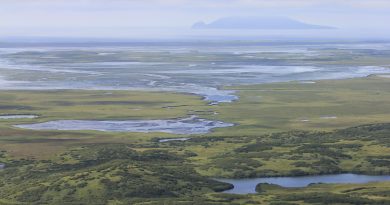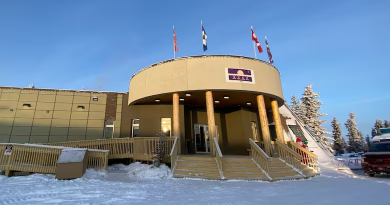Canada’s last fully intact ice shelf collapses in Arctic

The Milne Ice Shelf in Canada’s eastern Arctic territory of Nunavut has collapsed, and was the last fully intact ice shelf in the country, the Canadian Ice Service said in a tweet on Sunday.
Ice shelves are ice sheets that are attached to the shore line. The Milne Ice Shelf was located on the northwest coast of Ellesmere Island in Canada’s Arctic Archipelago.
Satellite animation, from July 30 to August 4, shows the collapse of the last fully intact #iceshelf in #Canada. The Milne Ice Shelf, located on #EllesmereIsland in #Nunavut, has now reduced in area by ~43%. #MilneIceIsland #seaice #Arctic #earthrightnow #glacier pic.twitter.com/jjs1gawoxA
— ECCC Canadian Ice Service (@ECCC_CIS) August 4, 2020
‘Recipe for break up’
All of Canada’s ice shelves are on Ellesmere Island says the Environment Canada website.
At the beginning of the 1900s, there was a 450 km ice sheet around the island that than broke up into six different ice shelves by the beginning of the 2000s, the department says.
Ice shelves in the Arctic are created by snow accumulating at the top of glaciers, while at the bottom, ice combines with multi-year land fast ice.
The Canadian Ice Service said in a tweet on Sunday that the break up caused the formation of an ice island that was approximately 72km squared.
“Above normal air temperatures, offshore winds and open water in front of the ice shelf are all part of the recipe for ice shelf break up,” the service said.
A huge section of the Milne #IceShelf has collapsed into the #Arctic Ocean producing a ~79 km2 ice island. Above normal air temperatures, offshore winds and open water in front of the ice shelf are all part of the recipe for ice shelf break up. #MilneIceIsland #Nunavut #seaice pic.twitter.com/fGfj8Me9tA
— ECCC Canadian Ice Service (@ECCC_CIS) August 2, 2020
“The initial break of this 4,000-year-old feature took place between July 30 and 31 and reduced the ice shelf area from 187 km2 to 106 km2 (43 per cent),” said a news release from Ottawa’s Carleton University, were several Milne Ice Shelf researchers work. “One large ice island was created at that time, but it split into two pieces (55 km2 and 24 km2) along with numerous smaller icebergs by August 3.”
Danger to ships, oil rigs to be monitored
Luke Copland, University Research Chair in Glaciology in the Department of Geography at the University of Ottawa, says the Milne Ice Shelf’s collapse is a reminder of the effects climate change is having on the Canadian Arctic.
“This summer has been up to 5°C warmer than the average over the period from 1981 to 2010, and the region has been warming at two to three times the global rate,” he said in the news release. “The Milne and other ice shelves in Canada are simply not viable any longer and will disappear in the coming decades.”
Adrienne White, an ice analyst at the Canadian Ice Service, Environment and Climate Change Canada, who has worked on the Milne Ice Shelf in the past and discovered the Ellesmere Island event says the broken off ice islands are now 70 to 80 metres thick and will need to be closely monitored so as not to risk the safety of boats or oil rigs as they travel.
“The ice islands are currently free-floating and mobile but for now they are confined to the coastline by pack ice,” White said.
Write to Eilís Quinn at eilis.quinn(at)cbc.ca
Related stories from around the North:
Canada: Fresh water is pouring into the Arctic Ocean. Climate change is to blame, new study says, CBC News
Greenland: COVID-19 delay, early ice melt challenge international Arctic science mission, The Associated Press
Iceland: Ice-free Arctic summers likely by 2050, even with climate action: study, Radio Canada International
Norway: Norway to expand network of electric car chargers across Arctic, The Independent Barents Observer
Russia: Record 38C temperature recorded in Arctic Siberia, Eye on the Arctic
Sweden: January temperatures about 10°C above normal in parts of northern Sweden, says weather service, Radio Sweden
United States: How sub-Arctic seas are influencing the Arctic Ocean and what it’s telling us about climate change, Eye on the Arctic




Thank you! ‘The truth shall set us free!’ (I hope there’s time!)
…and, back at the ranch, the government wants to subsidize expansion of the largest coal mine in N. America.